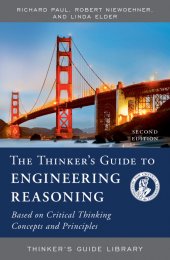The Thinker's Guide to Engineering Reasoning (Based on Critical Thinking Concepts and Tools)
Contact Info for Rowman & Littlefield:
- Toll free: (800) 462-6420 ext. 3024
- Fax: (800) 338-4550
- Orders to orders@rowman.com
- Queries to customercare@rowman.com
The Thinker’s Guide to Engineering Reasoning applies critical thinking concepts to the field of engineering. Students and professionals across engineering will find their analytical abilities enhanced by the engaging authoritative framework set forth by Richard Paul and Linda Elder.
For engineers to properly reason through engineering projects requires strong analytic skills. The best engineers are clear about their purposes, gather sufficient information, and develop innovations. This requires critical reasoning and this guide offers tools essential to this process.
As part of the Thinker’s Guide Library, this book advances the mission of the Foundation for Critical Thinking to promote fairminded critical societies through cultivating essential intellectual abilities and virtues across every field of study across world.
Rowman & Littlefield Publishers / The Foundation for Critical Thinking
Pages: 54 • Trim: 5 1/2 x 8
978-0-944583-33-3 • Paperback • January 2013
978-1-5381-3379-8 • eBook • June 2019
Series: Thinker's Guide Library
$28.00
Additional Information About:
The Thinker's Guide to Engineering Reasoning (Based on Critical Thinking Concepts and Tools)
This thinker’s guide is designed for administrators, faculty, and students. It contains the essence of engineering reasoning concepts and tools. For faculty, it provides a shared concept and vocabulary. For students, it is a thinking supplement to any textbook for any engineering course. Faculty can use it to design engineering instruction, assignments, and tests. Students can use it to improve their perspective in any domain of their engineering studies.
Generic engineering thinking skills apply to all technological disciplines. For example, engineering thinkers are clear as to the purpose at hand and the question at issue. We question information, conclusions, and points of view. We strive to be accurate, precise, and relevant. We seek to think beneath the surface, to be logical, and objective. We apply these skills to our reading and writing as well as to our speaking and listening. We apply them in professional and personal life.
Engineers and scientists are quite comfortable working within the context of conceptual models. We employ thermodynamic models, electrical models, mathematical models, computer models or even physical models fashioned from wood or clay. Here we apply a model of the way in which we think, an architecture whose purpose aids the analysis and evaluation of thought, that we might improve our thought.
It is important for the field of engineering to be understood as systems of overlapping and interrelated ideas, rather than isolated and different fields of knowledge. Moreover, it is important to recognize and effectively deal with the multiple environmental, social and ethical aspects that complicate responsible engineering. Accordingly, it is time for engineering educators to realize that effective engineering instruction cannot be based on memorization or technical calculation alone. Rather, it is essential that engineering students develop the generalizable critical thinking skills and dispositions necessary for effectively and professionally reasoning through the complex engineering issues and questions they will face as engineers.
